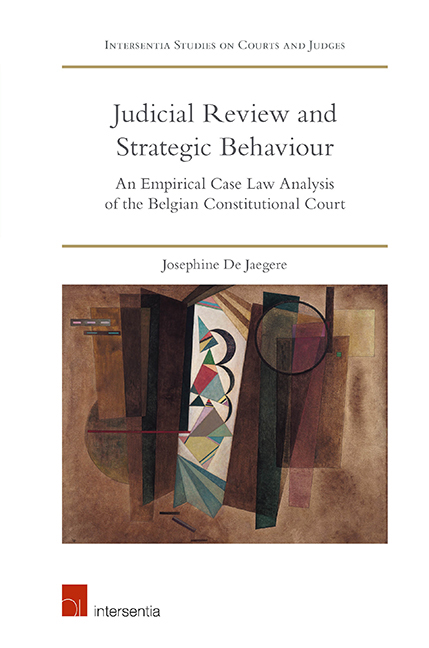 Judicial Review and Strategic Behaviour
Judicial Review and Strategic Behaviour Book contents
- Frontmatter
- Foreword
- Acknowledgements
- Contents
- Introduction
- PART I NORMATIVE FRAMEWORK: THE DELIBERATIVE PERFORMANCE OF CONSTITUTIONAL COURTS
- PART II THE CONTOURS OF JUDICIAL DECISION-MAKING
- PART III EMPIRICAL ANALYSIS OF THE BELGIAN CONSTITUTIONAL COURT'S CASE LAW
- Chapter 4 Translating Case Salience into Measurable Explanatory Variables
- Chapter 5 Case Outcomes
- Chapter 6 Citation Practices
- Chapter 7 Proportionality Analysis
- Conclusion
- Codebook
- Bibliography
- Index
- About The Author
Chapter 6 - Citation Practices
from PART III - EMPIRICAL ANALYSIS OF THE BELGIAN CONSTITUTIONAL COURT'S CASE LAW
Published online by Cambridge University Press: 26 June 2019
- Frontmatter
- Foreword
- Acknowledgements
- Contents
- Introduction
- PART I NORMATIVE FRAMEWORK: THE DELIBERATIVE PERFORMANCE OF CONSTITUTIONAL COURTS
- PART II THE CONTOURS OF JUDICIAL DECISION-MAKING
- PART III EMPIRICAL ANALYSIS OF THE BELGIAN CONSTITUTIONAL COURT'S CASE LAW
- Chapter 4 Translating Case Salience into Measurable Explanatory Variables
- Chapter 5 Case Outcomes
- Chapter 6 Citation Practices
- Chapter 7 Proportionality Analysis
- Conclusion
- Codebook
- Bibliography
- Index
- About The Author
Summary
INTRODUCTION
In principle, a constitutional ruling does not only include the final outcome, but also an (extensive) justification underpinning the decision. As explained in the normative framework, the requirement to give reasons is a special burden that weighs on courts. As a way to strengthen the justification, constitutional courts may document their judgments with citations of a variety of authorities. In each ruling, this reason-giving provides insight into the path of legal logic used to reach the judicial outcome. Citation patterns reveal where judges find their cues and what values they seek to promote. They are good indicators for understanding what arguments are considered legitimate for a given period of time. Hence, an extensive study of citation practices provides a window into the legal culture and the performance of courts.
Although the study of judicial reason-giving has increased considerably in importance, empirical analyses of citation practices have been, until now, mostly territorially concentrated in the United States, Canada, Australia and New Zealand. In continental Europe, this field has been relatively unexplored. An analysis of judicial citations can improve our understanding of the judicial role within the European context. Therefore, this chapter aims to add to this knowledge by exploring the reason-giving practice of the BeCC.
The plan of this chapter is as follows. In section 6.2., it is explained how the proper use of citations enhances the Court's deliberative performance. In short, courts should underpin their rulings with citations of applicable, persuasive and relevant authorities. More specifically, this section reflects on the added value of precedents, (inter)national case law, legislative history documents and secondary authorities in constitutional adjudication.
Subsequently, in section 6.3., the ten most common authorities cited by the Court are presented. In addition, the concept of ‘citation density’ is introduced, which measures the number of different authorities cited per ruling and can serve as a reasonable proxy for the judicial effort put into a ruling.
- Type
- Chapter
- Information
- Judicial Review and Strategic BehaviourAn Empirical Case Law Analysis of the Belgian Constitutional Court, pp. 229 - 282Publisher: IntersentiaPrint publication year: 2019
